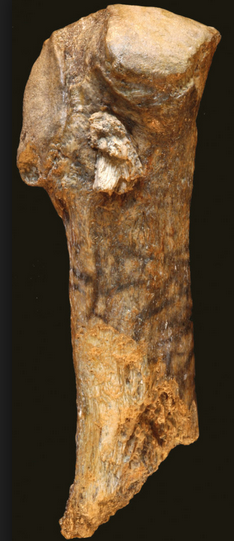13,800-year-old mastodon kill site in Washington
The mastodon kill site on Emanuel Manis’ property was discovered when he was digging through six feet of peat to make a small pond. Manis found two fossilized tusks that he thought had belonged to an elephant. When Washington State University archaeologist Carl Gustafson excavated the pond site in 1977, he quickly recovered one of the animal’s ribs with a bone projectile point in it. It was later determined from analysis of the animal’s tooth that the bones belonged to a mastodon.
Organic material found near the remains was dated to roughly 14,000 years ago. Controversy ensued, with members of the archaeological community refuting the dating because it hadn’t been done on the actual bones. In addition, multiple theories emerged as to how the bone fragment had come to be embedded in the mastodon rib, including an antelope attack.
Enter Texas A&M’s Mike Waters, who, in 2011, announced that he’d dated purified collagen in the bone, and that it was 13,800 years old. CT scans and 3-D projections of the rib with the projectile in it show that the bone fragment is, in fact, a spear point. For Waters, Manis wasn’t an isolated exercise in taking a second look at forgotten sites. As a case in point, he and his former graduate student, Jesse Halligan, now at the University of Wisconsin-Lacrosse, have recently re-excavated Page-Ladson, a sinkhole on the Florida panhandle that thousands of years ago would have been above sea level. There, in the 1980s and 1990s, archaeologists discovered that ancient people likely killed a mastadon in the sinkhole. They found several flakes from stone tools and a mastodon tusk with cut marks on it. Dating nearby seeds returned ages of about 14,400 years old. But, as with the Manis find, colleagues turned a blind eye to the results. Last summer, however, Halligan found a large fragment of a biface in the same layer as the previous finds. Radiocarbon dates on twigs and seeds found around it could confirm the earlier work at the site. “My philosophy is you can reinvestigate these sites that have promise and see if they pan out,” Waters says. “Sometimes you win, sometimes you lose.”











0 comments:
Post a Comment